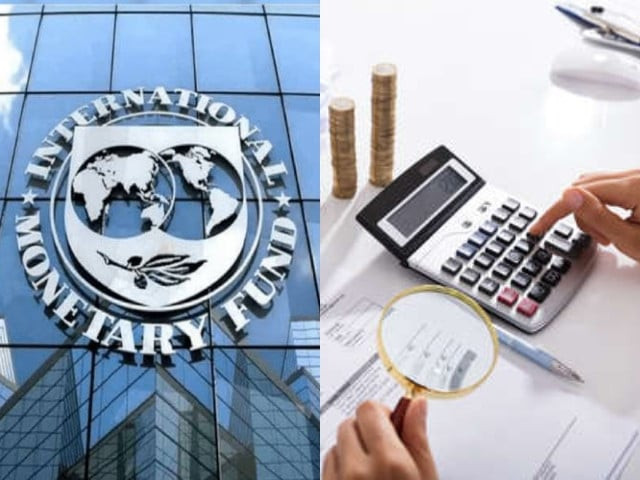IMF to vet budget before cabinet
Decision to delay budget beyond May 10 deadline violates act of parliament

The government is set to deliberately violate an Act of Parliament by not securing the approval of the federal cabinet for the Budget Strategy Paper until the International Monetary Fund (IMF) gives its nod to the fiscal policy.
This decision indicates that the finance ministry has prioritised the IMF bureaucracy over the elected representatives of the people, who sit in the federal cabinet and the standing committees of Finance of the National Assembly and the Senate. Sources within the Ministry of Finance informed The Express Tribune that the government has shelved a plan to obtain approval for the Budget Strategy Paper 2025-27 by May 10th – the statutory deadline outlined in the Public Finance Management Act.
As per the Act, the federal government must approve the budget strategy paper, containing quantified macroeconomic and fiscal projections for the medium-term, by May 10th of each year. The original deadline in the law was March 15th, which was subsequently revised to April 15th and then again revised to May 10th through amendments to the law. These deadlines were previously relaxed under the pretext that the estimated fiscal numbers of the outgoing fiscal year would not be ready by mid-April.
The sources disclosed that the decision to postpone the presentation of the budget strategy paper in the federal cabinet was made due to the upcoming IMF visit. They said that the cabinet’s approved figures would lack significance without IMF approval.
The budget strategy paper outlines the strategic priorities of the government’s revenue and spending policies and specifies indicative levels of spending in various ministries and divisions. According to the law, upon approval of the paper, the Finance Division will issue indicative budget ceilings to the ministries and divisions.
Another clause of the Act mandates the Minister for Finance to present and discuss the budget strategy paper with the Standing Committees for Finance and Revenue in the Senate and the National Assembly.
The delay in obtaining approval from the federal cabinet would also undermine the role of Parliament, as the standing committees would not have sufficient time to provide input on the budget. The IMF is also pressuring Pakistan to take measures like imposing further burdens on the salaried class. Excluding elected representatives from the budget-making process would amount to subjecting voiceless people to the IMF-Pakistan bureaucracy.
The Ministry of Finance spokesperson did not respond to inquiries regarding whether cabinet approval would be sought before May 10th or if it would wait until the end of the IMF mission.
According to another clause of the law, all government expenditures, whether recurrent or development demand for grants, shall be based on well-defined plans and strategic priorities approved in the budget strategy paper.
Finance ministry sources revealed that the ministry has drafted the budget strategy paper, which will first be shared with the IMF for vetting.
Finance Minister Muhammad Aurangzeb stated on Tuesday that the IMF mission would visit Pakistan in the next seven to ten days and stay for about two weeks. This leaves very little time for the federal cabinet and Parliament to provide input on the budget.
Finance ministry sources indicated that initial estimates suggest the size of next year’s budget might be in the range of Rs16.7 trillion. However, this figure remains tentative until the IMF approves various expenditures, particularly interest payments’ costs. For the current fiscal year, Parliament approved a Rs14.5 trillion budget.
The Ministry of Finance’s internal assessment suggested interest payments’ cost in the next fiscal year to be around Rs8.8 trillion, but the IMF has indicated a figure of Rs9.6 trillion in the first review report. Any alteration in this number would affect the total budget size.
Similarly, the finance ministry expects pension costs to be around Rs958 billion in the next fiscal year, compared to Rs801 billion this year. Grant costs might be Rs1.5 trillion in the next fiscal year, up from Rs1.3 trillion this year. Subsidies might also increase to Rs1.5 trillion from nearly Rs1.4 trillion this year. The cost of running the civil government could rise to Rs821 billion in the next fiscal year from Rs716 billion this fiscal year, the sources added.
There is also uncertainty regarding total revenues and the budget deficit. If the government sets the Federal Board of Revenue’s tax target around Rs11 trillion, the fiscal deficit could be 6.8% of GDP. However, if the target is set around Rs12.3 trillion, the budget deficit target might be 6.3% of GDP, said the sources. The final decision will be made by the IMF. Revenue from the petroleum levy might reach close to Rs1.1 trillion in the next fiscal year.
The IMF Fiscal Monitor report indicates that the government’s total revenues may remain at 12.5% of GDP during this fiscal year, expected to slightly decrease to 12.4% in the next fiscal year. In comparison, government expenditures are estimated to be 19.9% of GDP for this fiscal year, marginally decreasing to 19.6% in the next fiscal year.
The widening gap between expenditure and revenues has left the federal government at the mercy of commercial banks. Due to the IMF’s policy of completely closing the central bank borrowing window for the federal government, commercial banks are now fully exploiting the federal authorities. With the budget deficit consistently exceeding 7% of GDP, the central bank is indirectly lending to the federal government through commercial banks, leading to increased government borrowing costs.
Published in The Express Tribune, May 9th, 2024.
Like Business on Facebook, follow @TribuneBiz on Twitter to stay informed and join in the conversation.



















COMMENTS
Comments are moderated and generally will be posted if they are on-topic and not abusive.
For more information, please see our Comments FAQ